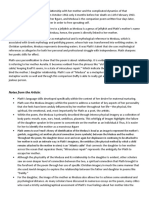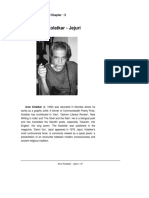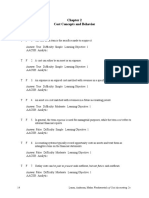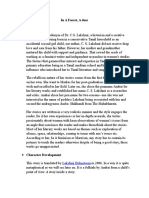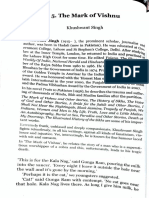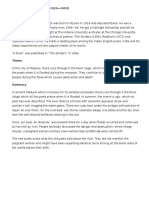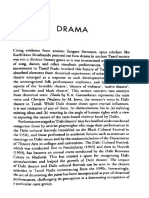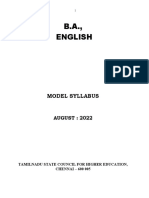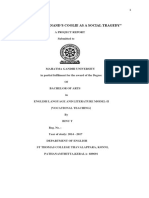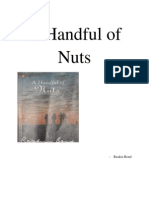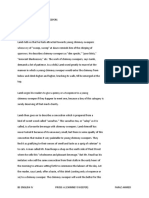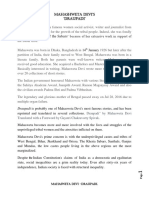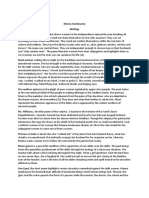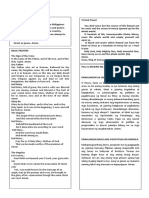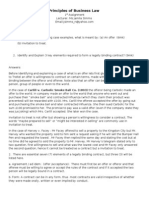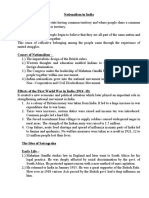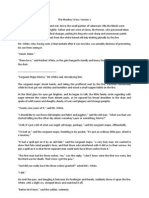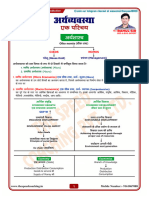In All Her Stories, Ambai Questions Roles, Rules and Identities of Women. Justify With Reference To The Short Story "Forest"
In All Her Stories, Ambai Questions Roles, Rules and Identities of Women. Justify With Reference To The Short Story "Forest"
Uploaded by
Pranavi A.V.SCopyright:
Available Formats
In All Her Stories, Ambai Questions Roles, Rules and Identities of Women. Justify With Reference To The Short Story "Forest"
In All Her Stories, Ambai Questions Roles, Rules and Identities of Women. Justify With Reference To The Short Story "Forest"
Uploaded by
Pranavi A.V.SOriginal Description:
Original Title
Copyright
Available Formats
Share this document
Did you find this document useful?
Is this content inappropriate?
Copyright:
Available Formats
In All Her Stories, Ambai Questions Roles, Rules and Identities of Women. Justify With Reference To The Short Story "Forest"
In All Her Stories, Ambai Questions Roles, Rules and Identities of Women. Justify With Reference To The Short Story "Forest"
Uploaded by
Pranavi A.V.SCopyright:
Available Formats
In all her stories, Ambai questions roles, rules and identities
of women. Justify with reference to the short story "Forest".
- Pranavi A.V.S
Ambai: A Short Introduction
C.S.Lakshmi, known by her pen name Ambai, is an eminent
feminist writer in the Indian canon of literature. Ambai hails from
Tamil Nadu and wrote most of her stories in Tamil which were later
translated into English by Lakshmi Holström. One of her short story
collection titled “A Kitchen in the Corner of the House” is taken into
perspective with specific references to the short story “Forest”.
The idea of alienation or estrangement is seen in many of
Ambai’s stories. It is through these impressions that Ambai proceeds
to question various roles or rules set for women in the society. Yet, it
is not through detachment from the social constraint that Ambai
challenges the notions. Instead, she chooses to place her characters
right in the midst of the complication and through a whirlwind of
their emotions, seeks answers for the various questions she poses.
The reader also finds that she breaks stereotypes by making bold
moves that were hitherto considered as a taboo. For instance, in the
short story simply titled “Journey 4”, one can find an intensely
unthinkable action of a father-in-law impregnating his own daughter-
in-law, Kamalam, to make up for his son’s infertility and the more
shocking realization that she was in acceptance with it. After reading
her stories, one finds that she not just redefines the roles, rules and
identities of a woman in her own terms but also courageously makes
them legitimate through the minds or thoughts of her characters.
The ‘role’ of a woman has been traditionally described to be
that of a home-maker where women spend their entire lives looking
after their husband, in-laws and children. This role has been
beautifully examined in her eponymous short story where Dularibai
‘Jiji’ spent all of her life in the kitchen, to the extent that she could
not imagine herself without it. She asks, “But if I free
myself…then…what is left?” In the story “Once Again” the life
of Sabari as pertaining to the expectations of the society had been
given in short, crisp lines. Yet, in all these stories, by depicting what
the patriarchal ideology of the ‘ideal’ woman is, she searches for the
role which a woman could fulfil without having to answer any
external authority.
When talking about women’s’ freedom, it is imperative to talk
about the various rules that the social institution sets to keep them
under its control. This has been dealt by Ambai not by detaching the
woman questioner from the situation but by placing them right in
the center of it and making the readers feel their emotions. This
technique can be clearly seen in her story “Wrestling” where
Shenbegam was suppressed from flourishing her music career by her
husband Shanmugam just because he was jealous that she was
better than him. Because she was a woman, she was easily
oppressed by the male figure by reasons of family and marriage.
The crisis of the female identity is one unique approach in
Ambai’s stories. In the story “Wheelchair” this dilemma is clearly
seen. Hitha gets involved with some pseudo-revolutionaries and
questions her own self in the midst of their hypocrisy. Though her
female characters form the story’s emotional crux, by the end, some
sort of justice, solution or closure is provided to enforce the idea that
a woman can solve her own problems without any external help.
“Forest”: In Perspective
In the short story “Forest” too, Ambai questions, in her own
way, the role of a woman, the rules that govern her and the search
for her identity amidst the societal chaos. Chenthiru embarks on a
quest to discover her identity and was the tool to ponder on these
topics. Initially, one finds that Ambai discusses the role of women
when she mentions that Chenthiru was actually an entrepreneur
who helps expand Thirumalai’s business but is later asked not to get
involved in it with the excuse that “his other business partners
couldn’t quite see it”; a statement which puts down a woman’s
ability and confines them to household matters.
Ambai also questions various rules laid down by the society for
a woman through the lines, “a woman only went to the forest
meekly accompanying her husband”, “It was most
appropriate for a woman to be… journeying along with her
husband.” When Chenthiru embarks to the forest alone, when she
decides to write Sita’s ayanam and when she writes it in a completely
new light showing Rama’s failings as a husband, Ambai was
questioning through her character and her retelling why a woman
must pertain to a set of guidelines laid down by the patriarchy.
The uncertainty of a woman’s identity was explored through
the parallel stories of Chenthiru and Sita when both had to come to
the forest. Chenthiru contemplates “What do I seek? And how?
Do I even seek?” - The dilemma of a woman’s purpose after she is
no longer needed by the family. In the end, when Sita accepts
Ravana as her music guru, she asks him not to give her the vinai but
to lay it on the ground as a metaphor that she had had enough of
being tossed about; “It is my life, isn’t it? Now, let me take
hold of it; take it into my hands.” giving identity its freedom.
WORKS CITED
Ambai. (2019). A Kitchen in the Corner of the House. (L. Holmstrom, Trans.)
Madras, India: Penguin Random House.
You might also like
- Analysis of "Medusa" by Sylvia PlathDocument6 pagesAnalysis of "Medusa" by Sylvia Plathtony stark50% (4)
- Manto - Open It (Khol Do)Document3 pagesManto - Open It (Khol Do)existrandomNo ratings yet
- PinjarDocument5 pagesPinjarsai priya tirumalasettyNo ratings yet
- Muktadhara Tagore Play PDFDocument25 pagesMuktadhara Tagore Play PDFRajendran Dhanapal0% (1)
- Unit 9: Amitav Ghosh: "The Diaspora in Indian Culture"Document11 pagesUnit 9: Amitav Ghosh: "The Diaspora in Indian Culture"Mehak Kamboj100% (1)
- Jejuri - Kolatkar AnalysisDocument12 pagesJejuri - Kolatkar AnalysisSaurabh Wadhwa100% (1)
- Judas Poem Text and SummaryDocument2 pagesJudas Poem Text and SummaryDevaki Subasri86% (7)
- Mor 479Document13 pagesMor 479socalsurfyNo ratings yet
- Downloadable Test Bank For Fundamentals of Cost Accounting 2nd Edition Lanen 1Document37 pagesDownloadable Test Bank For Fundamentals of Cost Accounting 2nd Edition Lanen 1Lorren K GonzalesNo ratings yet
- In A Forest, A DeerDocument5 pagesIn A Forest, A DeerJanki Desai57% (7)
- Love and Death Sarojini Naidu: NotesDocument2 pagesLove and Death Sarojini Naidu: NotesAnonymous OP6R1ZSNo ratings yet
- Extra Samskara ThemesDocument17 pagesExtra Samskara ThemesAisha RahatNo ratings yet
- Toru Dutt's LaxmanDocument8 pagesToru Dutt's LaxmanAjay Dhawale100% (1)
- Combing SummaryDocument10 pagesCombing Summarymeera cmNo ratings yet
- The Mark of VishnuDocument6 pagesThe Mark of VishnuNarayanaNo ratings yet
- A Detailed Description of The Hunchback in The ParkDocument9 pagesA Detailed Description of The Hunchback in The ParkMorning Queens67% (3)
- The Looking GlassDocument2 pagesThe Looking GlassShubhadip Aich100% (1)
- Women Characters in Fire and The RainDocument3 pagesWomen Characters in Fire and The RainBipasha SenNo ratings yet
- Swami and FriendsDocument16 pagesSwami and FriendsUzumaki NarutoNo ratings yet
- Meghadūta - The ThemeDocument4 pagesMeghadūta - The ThemesasoikumarNo ratings yet
- Elements of Indian Ness in Jayanta MahapatraDocument9 pagesElements of Indian Ness in Jayanta MahapatraBhawesh Kumar Jha50% (2)
- Unit 7 TughlaqDocument7 pagesUnit 7 Tughlaqgaya50% (2)
- Age of Hardy (1887-1928)Document11 pagesAge of Hardy (1887-1928)Sandeep Kumar VijayarajuNo ratings yet
- Untitled DocumentDocument8 pagesUntitled Documentbfh88j18100% (2)
- RiverDocument8 pagesRivermanojboa100% (1)
- Touch by K.A Gunasekaran PDFDocument8 pagesTouch by K.A Gunasekaran PDFMegha BlueskyNo ratings yet
- Sir Roger at TheatreDocument2 pagesSir Roger at TheatreSameeha M100% (7)
- Freedom 231125 222126Document8 pagesFreedom 231125 222126Karmu Potato100% (1)
- Bede's Death Song: A Modern English Translation, Summary and Analysis of The Old English (Anglo-Saxon) PoemDocument3 pagesBede's Death Song: A Modern English Translation, Summary and Analysis of The Old English (Anglo-Saxon) PoemSako HousuNo ratings yet
- Character Analysis of Sir Roger de Coverley in Addison's EssayDocument7 pagesCharacter Analysis of Sir Roger de Coverley in Addison's EssayRohit DahiyaNo ratings yet
- Indian-Women Critical AnalysisDocument2 pagesIndian-Women Critical AnalysisAbhishek M N50% (8)
- Exploitation and Deprivation of Women in Jayanta Mahapatra'S PoemsDocument3 pagesExploitation and Deprivation of Women in Jayanta Mahapatra'S PoemsDaffodil100% (1)
- TANSCHE BA English Syllabus - UpdatedDocument149 pagesTANSCHE BA English Syllabus - UpdatedSam JeromeNo ratings yet
- Analysis - of - The - On An Asian Poet Fallen Among American TranslatorDocument2 pagesAnalysis - of - The - On An Asian Poet Fallen Among American TranslatorShahmir Azhar100% (1)
- Rajmohan's WifeDocument4 pagesRajmohan's WifeDavid0% (1)
- Confessions in The Poems of Kamala Das and Tara Patel: A Comparative StudyDocument14 pagesConfessions in The Poems of Kamala Das and Tara Patel: A Comparative StudyGomathi SivakumarNo ratings yet
- Major Indian English WritersDocument3 pagesMajor Indian English WritersManju Haridas100% (1)
- Mulk Raj Anand'S Coolie As A Social Tragedy"Document30 pagesMulk Raj Anand'S Coolie As A Social Tragedy"Brince Mathews100% (2)
- Handful of NutsDocument7 pagesHandful of NutsNaveen Vachipalli80% (5)
- 2.1 Our Casuarina TreeDocument20 pages2.1 Our Casuarina TreeAnu Elezabath Varughese100% (2)
- Sir Roger at Church TextDocument7 pagesSir Roger at Church Textsandip pandey100% (3)
- BullockyDocument22 pagesBullockySara Namoury67% (3)
- 4TH Sems Prose-A The Praise of Chimney SweeperDocument19 pages4TH Sems Prose-A The Praise of Chimney Sweeperali100% (5)
- Self Portrait by ADocument4 pagesSelf Portrait by ASyeda Fatima GilaniNo ratings yet
- An Introduction by Kamala DasDocument2 pagesAn Introduction by Kamala Daslisa_vayakkara8624100% (1)
- "Purdah" Poem by Imtiyaz Dharker: ExplanationDocument2 pages"Purdah" Poem by Imtiyaz Dharker: ExplanationPreeti GaurNo ratings yet
- Mahasweta Devi DraupadiDocument4 pagesMahasweta Devi DraupadiAnirban BanikNo ratings yet
- Sir Roger at The Theatre & The SpectatorDocument4 pagesSir Roger at The Theatre & The SpectatorJeyarajan100% (1)
- Dead WomenDocument8 pagesDead WomenManu James100% (1)
- Women's Quest For Self in Anita Desai's - Where Shall We Go This SummerDocument4 pagesWomen's Quest For Self in Anita Desai's - Where Shall We Go This SummerIJELS Research Journal100% (1)
- A Cup of Tea by Katherine Mansfield - SummaryDocument4 pagesA Cup of Tea by Katherine Mansfield - SummaryAhmed Mohmud0% (1)
- To My Daughter: N. Balamani Amma (B. 1909Document3 pagesTo My Daughter: N. Balamani Amma (B. 1909Adwaith Jayakumar0% (1)
- Sita by Toru Dutt Summary - Question-Answer-class 12 - Notes On PhoneDocument20 pagesSita by Toru Dutt Summary - Question-Answer-class 12 - Notes On PhoneAlfred50% (2)
- Mukta Dhara - Rabindranath TagoreDocument8 pagesMukta Dhara - Rabindranath TagoreRajamohanNo ratings yet
- A Fine Balance EssayDocument5 pagesA Fine Balance EssayElliot Kardon100% (3)
- Behind The Bodice.Document30 pagesBehind The Bodice.Ganga pal100% (1)
- Sea Breeze Bombay by Adil JussawallaDocument3 pagesSea Breeze Bombay by Adil JussawallaDevyani ChettriNo ratings yet
- An Introduction by Kamala DasDocument7 pagesAn Introduction by Kamala DasKakoli Sen Gupta100% (1)
- Sonnet 6Document4 pagesSonnet 6Brahmankhanda Basapara HIGH SCHOOLNo ratings yet
- Paul Hawkens YOu Are Brilliant and The Earth Is HiringDocument3 pagesPaul Hawkens YOu Are Brilliant and The Earth Is HiringFrederic LabartheNo ratings yet
- APAMI 3.0 Instruction ManualDocument13 pagesAPAMI 3.0 Instruction ManualawalNo ratings yet
- PRAYERDocument1 pagePRAYERVeverlyn SalvadorNo ratings yet
- Introduction of Printing Presses and Publications Act 1984Document4 pagesIntroduction of Printing Presses and Publications Act 1984Wan Shakiki MazlanNo ratings yet
- Egyptian Civilization: Management AntiquityDocument6 pagesEgyptian Civilization: Management AntiquityMostaque Ahmed AnntoNo ratings yet
- Grade 11 2024 Business Studies Grade 11 AtpDocument20 pagesGrade 11 2024 Business Studies Grade 11 AtpzandilemadideNo ratings yet
- Principles of Business Law (1st Assig.)Document2 pagesPrinciples of Business Law (1st Assig.)Junior N. ThorpeNo ratings yet
- Historical and Cultural Backround of Latin American MusicDocument5 pagesHistorical and Cultural Backround of Latin American MusicAnonymous E4Gi0oTNo ratings yet
- A Major Multinational Outsources Its Head Office Information Technology FunctionDocument16 pagesA Major Multinational Outsources Its Head Office Information Technology FunctionAhmad RizalNo ratings yet
- Nationalism in IndiaDocument13 pagesNationalism in IndiaAmitesh Kumar Singh100% (1)
- 2.7 Nepomuceno v. NarcisoDocument3 pages2.7 Nepomuceno v. NarcisoCharm Tan-CalzadoNo ratings yet
- BC Newcomers Guide PDFDocument122 pagesBC Newcomers Guide PDFoakfedNo ratings yet
- 9 Science Quarter 3 Module 3Document22 pages9 Science Quarter 3 Module 3Sia AlarieNo ratings yet
- Introduction TrolleyDocument16 pagesIntroduction TrolleyVishnuDarshiniNo ratings yet
- Nit Wise Final Select List of Sub Inspec R F Pol CE CIVIL) - 2019 With Respect To Central Ange Enga URUDocument3 pagesNit Wise Final Select List of Sub Inspec R F Pol CE CIVIL) - 2019 With Respect To Central Ange Enga URUManish ChavannavarNo ratings yet
- Answer: Government of India Finance Lok SabhaDocument1 pageAnswer: Government of India Finance Lok SabhaRavi Rai MarwahNo ratings yet
- 1st Day Lecture - CHN 2 PDFDocument6 pages1st Day Lecture - CHN 2 PDFR-Chian Jose GermanpNo ratings yet
- EAuction User ManualDocument14 pagesEAuction User ManualNAKSH CREATIONNo ratings yet
- Evaluacion Diagnostica Tercer AñoDocument3 pagesEvaluacion Diagnostica Tercer AñoEfrén Ruilova MerchánNo ratings yet
- Cultural Kow-HowDocument5 pagesCultural Kow-HowCGNo ratings yet
- Qut KC88 40883 Int Cms UnitDocument14 pagesQut KC88 40883 Int Cms Unitji yaNo ratings yet
- Reflection PaperDocument1 pageReflection PaperAlyana Nicole PagdilaoNo ratings yet
- The Monkey Paw Script - 001Document5 pagesThe Monkey Paw Script - 001tom_begNo ratings yet
- NETF Awareness Bulletin - Overview of Devices Used in Nationwide Protests From May 2020 To PresentDocument9 pagesNETF Awareness Bulletin - Overview of Devices Used in Nationwide Protests From May 2020 To PresentEric Galvan100% (1)
- Book of Mormon - Man Up LyricsDocument5 pagesBook of Mormon - Man Up LyricsDaniel MilesNo ratings yet
- Saputo Strategic AnalysisDocument20 pagesSaputo Strategic AnalysisScott CuthbertNo ratings yet
- Municipal LiabilityDocument4 pagesMunicipal LiabilityKira Jorgio100% (1)
- 1 Economics IntroductionDocument8 pages1 Economics IntroductionShubhamNo ratings yet

